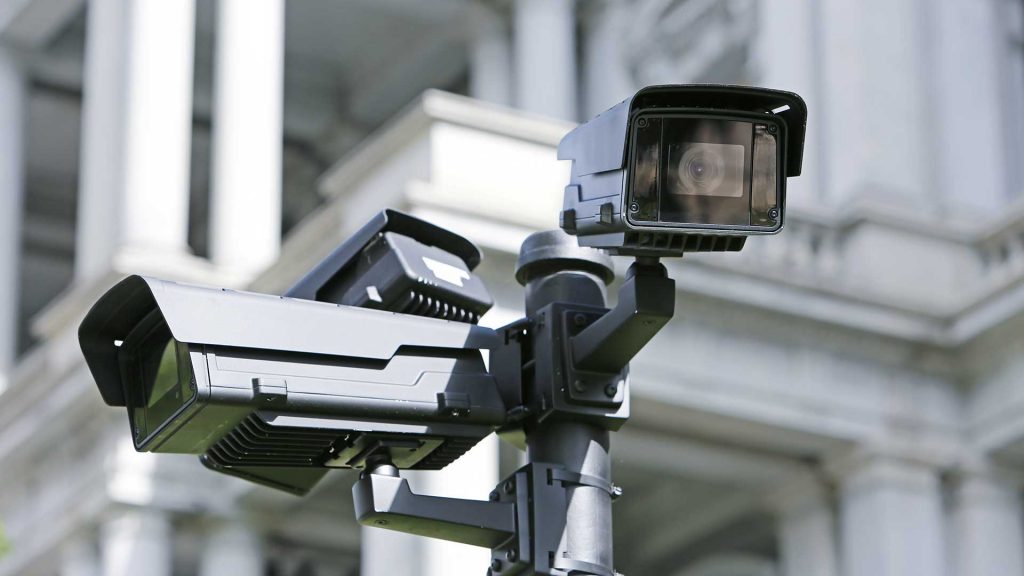
The city of Los Angeles houses more than 4 million people and more than 23,000 surveillance cameras, which makes it the most watched city in the country — albeit that pales in comparison with Taiyuan, China, which has 465,255 cameras, nearly 120 devices per 1,000 people, according to Comparitech.
CCTV cameras have been capturing people’s activities since the late 1940s when it was first implemented to monitor commercial spaces. Naturally, the devices have become an integral component to police investigations, but they’re not the only recording equipment engaged by law enforcement. Technological advancements such as cameras on squad cars, acoustic sensors and cellphone programs that extract data all advance policing capabilities.
The digitization of traffic and streetlight cams have improved the quality of images, but it’s been the proliferation of installations — estimated to exceed 1 billion worldwide this year — that offers additional surveillance value because of the more expansive coverage. Programs like Citizen Virtual Patrol expand accessibility, too. Users can pull up images of streets, sidewalks and building exteriors collected by publicly owned cameras from any laptop.
Also, police agencies across the country have deployed automatic license plate readers (ALPRs) on patrol vehicles. These compact cameras snap images of passing cars’ license plates, simultaneously logging geospatial specifics. That data is then mined to identify stolen vehicles or cars alleged to be used in crimes.
Another technology gaining favor with law enforcement is the ShotSpotter, an acoustic sensor designed to recognize loud, impulsive sounds between 120 and 160 decibels, such as gunshots. When a suspicious sound is recorded, an alert triggers a human review, and if it’s suspected to be shots fired, the local police department is notified and provided details of where, when and how many shots detected. Per the 2020 ShotSpotter National Gunfire Trends report, there was a 48% increase in gunshot incidents reviewed last year compared with 2019 based on data collected from more than 100 cities using the technology.
We all know smartphones hold a plethora of details that could prove pertinent to an investigation. Although court orders often are required, international mobile subscriber information (IMSI) software, such as Stingray, mimic cell towers and harvest metadata from phones in the area, including location, text messages, website browsing history and call logs, all critical to building cases.
Of course, with new technology come new concerns for privacy. For example, IMSI doesn’t target specific suspects. Rather, Stingray casts a broad net over all phones in a given location at a given time, which includes individuals who may have nothing to do with an investigation. Opponents of the technology suggest the expectation of privacy by these innocent bystanders should be considered and protected. IMSI strategies engaged during last summer’s protests also were roundly criticized for potential infringement of civil rights.
ALPRs have come under scrutiny for a variety of reasons, including privacy violations. However, last fall, the Virginia Supreme Court ruled that a vehicle’s license plate, location and time are not considered personal identifying information, and therefore, the program is a legitimate policing tool.
There’s additional concern over how long agencies hold onto the data and whether they share it with other departments, including federal agencies like Immigration and Customs Enforcement. The Guardian reported that a 2019 audit of police agencies revealed departments regularly exchanged such data, in some cases passing it along to hundreds of other law enforcement organizations. Journalist Jon Fasman, author of We See It All: Liberty and Justice in an Age of Perpetual Surveillance, told NPR that ALPR regulations vary from state to state, and some states have no restrictions at all.
California State Senator Scott Wiener cited a 2019 audit of the Los Angeles Police Department ALPR files that showed only 400,000 of the 320 million images could be traced to vehicles of interest due to possible connection to crimes as reason for introducing the License Plate Privacy Act bill last month. If signed into law, it would require scheduled audits of departments use of ALPRs and prohibit retaining irrelevant data as well as restrict sharing of data.
“I’m not suggesting in writing about the dangers of ALPRs that we eliminate them, because it does help find stolen cars. It does help find cars used in crimes. The issue is what about the 99.99% of cars that aren’t involved in crimes? What do you do with their data?” questioned Fasman.





